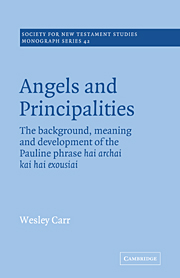 Angels and Principalities
Angels and Principalities Published online by Cambridge University Press: 06 January 2010
Colossians
Background
Much of the evidence for Paul's concept of αὶ ἀρχαὶ καὶ αἰ ἐξουσίαι is derived from the epistle to the Colossians, and the interpretation of Col. 2: 15 has been determinative in many understandings of the world of the powers. It is therefore the obvious place with which to begin the exegetical study of the NT texts. This is, however, a most difficult epistle to use in any assessment of a Pauline theme. Not only is the nature of the error that the writer opposes unclear, but the authorship of the letter and its destination are both doubtful.
On the question of authorship the arguments have been well rehearsed in the standard introductions and commentaries. I accept the epistle as from the hand of Paul. The matter of the destination, however, is of particular importance for our study. For although Colossae, one of three destinations for this letter (4: 13), was a place of little significance in itself, from the point of view of the development of Christianity in that region of Asia Minor it may have been most important. The three cities of Colossae, Laodicea and Hierapolis were set in the Lycus Valley, where Caria, Lydia and Phrygia meet. In addition, the road system created by the natural barriers made this a key intersection.
To save this book to your Kindle, first ensure [email protected] is added to your Approved Personal Document E-mail List under your Personal Document Settings on the Manage Your Content and Devices page of your Amazon account. Then enter the ‘name’ part of your Kindle email address below. Find out more about saving to your Kindle.
Note you can select to save to either the @free.kindle.com or @kindle.com variations. ‘@free.kindle.com’ emails are free but can only be saved to your device when it is connected to wi-fi. ‘@kindle.com’ emails can be delivered even when you are not connected to wi-fi, but note that service fees apply.
Find out more about the Kindle Personal Document Service.
To save content items to your account, please confirm that you agree to abide by our usage policies. If this is the first time you use this feature, you will be asked to authorise Cambridge Core to connect with your account. Find out more about saving content to Dropbox.
To save content items to your account, please confirm that you agree to abide by our usage policies. If this is the first time you use this feature, you will be asked to authorise Cambridge Core to connect with your account. Find out more about saving content to Google Drive.